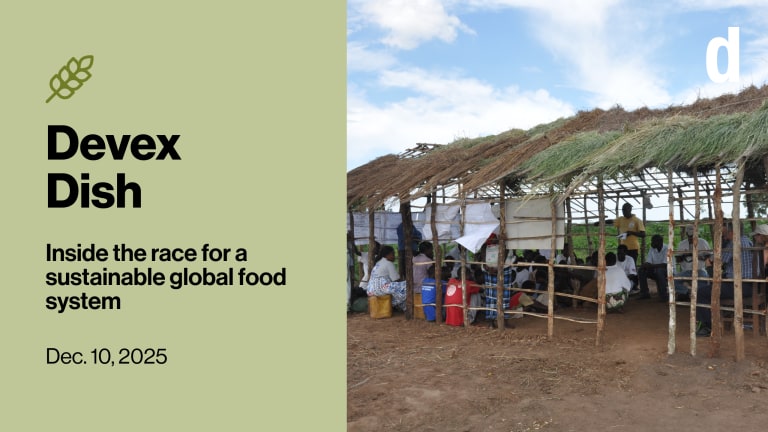10 lessons the Syrian refugee crisis can teach us about cash transfers
Cash transfers now play an increasingly vital role in humanitarian action, but many questions remain as to how cash-based assistance should be designed and implemented to reach maximum efficiency.
Nongovernmental organizations have long called for the use of cash transfers not just as part of poverty alleviation efforts but also in emergency settings. Cash transfers, international relief groups argue, could not only empower beneficiaries to purchase based on their needs but stimulate local economies as well. But although cash transfers now play an increasingly vital role in humanitarian action, many questions remain as to how cash-based assistance should be designed and implemented to reach maximum efficiency. With various large-scale programs having been conducted in the Middle East, notably in Jordan and Lebanon, the current Syrian refugee crisis has taught implementing partners many lessons on how cash can be used. Unlike in underdeveloped economies or disaster-stricken areas, most Syrian refugees in Jordan and Lebanon are living outside of camps, and can find most basic goods in local markets. A fully functioning banking sector in both countries has also allowed for cash transfers and food vouchers to be delivered in electronic form. While this framework somewhat limits the ability of humanitarian organizations to replicate this model in other emergency settings, it has provided some insights into the role refugees can play in host communities. 1. Cash transfers in emergency settings have no negative side effects — at least in the short to medium term. Through the years, randomized controlled trials have underlined the positive impact of cash transfers on poverty alleviation and development efforts. But while there have been studies proving the benefits of cash transfers in emergency settings, the first scientific evaluation was done only recently. Last month, the International Rescue Committee released the results of that evaluation, which was based on U.N. High Commissioner for Refugees’ 2013-2014 winter cash assistance to Syrian refugees in Lebanon. During the period, more than $40 million were disbursed to 87,700 beneficiaries. Not only did the study not find any negative side effects to cash transfers, but it also showed recipients didn’t spend the money irresponsibly. Cash was also found to increase school attendance and decrease child labor. 2. Cash transfers have a “multiplier effect” on local economies. The IRC study showed cash transfers had a significant impact on local markets; each dollar recipients spent recipients during the winter program generated $2.13 of gross domestic product for the Lebanese economy. This was perhaps the most significant finding for host communities and governments wary of cash transfers. “One of the major selling points for governments across the region has been the multiplier effect,” Louisa Seferis, regional livelihoods and cash adviser for the Danish Refugee Council, told Devex. “We were basically saying, instead of shipping goods that have been purchased elsewhere, we’re talking about giving people money they can spend in your markets, in your local communities.” 3. The private sector has an increasing role to play in humanitarian settings. Cash transfers take many forms, ranging from grants and conditional transfers to indirect cash transfers and cash-for-work and voucher programs. While much of this money continues to be disbursed directly in cash to the beneficiaries, using bank cards, remittance services and mobile transfers has become increasingly popular. This shift to electronic transfers has provided an opportunity to partner with local banks for implementation. UNHCR identified CSC Bank early on as a partner in Lebanon, notably because of its large geographical coverage. But the relationship with CSC proved even more valuable, as the bank provided some much-needed customer service to recipients as they were getting accustomed to the new system or trying to solve some technical issues. A report released in July by the Overseas Development Institute, and citing the collaboration between Ahli Bank and the World Food Program in Jordan, underlined the potential of partnerships with the private sector for cash transfers and other types of service delivery. Organizations should be mindful, however, that the private sector responds to business, and not humanitarian imperatives. 4. Assessment is key. Organizations involved in the 2013-2014 winter cash assistance program have found themselves rushing into implementation, only to be confronted with issues stemming from a lack of preliminary assessment of the situation on the ground. “There’s this assumption that when you have this great financial infrastructure, it will be very easy to implement these sorts of programs,” said Radha Rajkotia, IRC’s senior director for economic programs. “But once you get into the details of how the programs really run, there are all sorts of operational challenges.” Organizations should assess the feasibility of the program, as well as their own capacity to run complex and large-scale cash transfers. More importantly, they should assess the potential impact of cash transfers on local markets to avoid distortion. Can markets accommodate an increased demand? Can recipients buy basic goods locally? Such questions determine the modalities of cash transfers and whether they should be paired with in-kind donations. 5. Cash vs. in-kind: Cheaper isn’t always better. Humanitarian organizations are sometimes tempted to complement cash transfers with in-kind donations, especially when they can buy items cheaper and in bulk elsewhere. But a study commissioned by the European Commission’s Humanitarian Aid and Civil Protection Department on the impact of cash assistance in Lebanon showed that in-kind donations and vouchers had more negative “side effects,” including items being resold on local markets. In contrast, cash allowed recipients to buy according to their needs and priorities, and reduced the potential for market distortion. However this doesn’t mean that in-kind donations shouldn’t be used. “Not everything can be monetized,” Dalia Sbeih, CARE Lebanon’s program coordinator for cash and nonfood items, told Devex. Because families are working with tight budgets, they may not be able to prioritize less urgent, but equally important needs, such as health and education. 6. Refugees should be seen as economic actors. While traditional assistance to refugees may restrict their involvement with host communities, cash transfers allow them to keep a certain level of control over their livelihoods, and play a positive role on local markets. “We need to start working with refugees as economic actors rather than beneficiaries,” DRC’s Seferis said, adding that humanitarian organizations should strive to better understand the needs and priorities of refugees and their rationale for decision-making. “Cash forces us to have a conversation with people rather than just speaking at them.” This vision shift is in line with a growing body of evidence that shows refugees can become productive economic actors in their host communities. 7. Figuring out who should get the money, and how much, is complicated — and it’s not about to get easier anytime soon. While organizations tend to evaluate the amounts given to recipients based on an estimation of what they need to fill their basic needs, more attention should be put on analyzing actual household expenditures to get a better sense of where the money is needed. “It’s a slight difference that will help having a stronger kind of household economy approach,” IRC’s Rajkotia said. Complicating this process is the fact that cash assistance programs to Syrian refugees have been underfunded, and implementing organizations have had no other choice but to leave out households in need. While donors and NGOs are working on creating formulas to target the most vulnerable households, this might translate into additional confusion among refugees. “When we have a formula that I cannot even explain to you because it hasn’t been properly explained to me, then how are we going to talk to refugees about who receives and who doesn’t?” Seferis asked. 8. Make it simple. Many organizations have been implementing cash transfers to Syrian refugees, with as many sets of priorities, processes and selection criteria. Most recipients currently use two cards — one for e-vouchers from WFP and another for cash transfers from a local implementing partner — which increases confusion. Cash transfers could be improved through harmonization, from assessment to targeting, delivery and monitoring. However this would require that donors and implementing partners let go of their sector-based approach and reflect on whether so many actors are needed in the first place. 9. Let go of the money. While the benefits of cash transfers are now being recognized by a majority of humanitarian actors, unrestricted cash still causes some uneasiness, leading donors and NGOs to heavily monitor where the money goes. But with so many partners involved, each with their own assistance modalities, making sure that cash goes into the right hands and serves the right purposes can become a logistical nightmare. “At some point, our data team had to configure 26 different types of distribution lists based on the type of assistance, where people were located, and what they were intended to receive,” Seferis recalled. DRC handled the overall card management during the winter assistance program in Lebanon. Harmonizing the system would help address these issues, but donors and organizations should also release some of their control over how the cash is being spent, and trust that households are making the best decisions for themselves. 10. Many questions still need to be answered to improve cash-based assistance. The long-term impact of cash transfers on social dynamics and local markets, potential host community fatigue, and the overall economic impact of refugee populations are just some of the areas in which further research needs to be conducted. All actors involved, from donors to local governments, humanitarian organizations and recipients, stand to benefit from a better understanding of how cash can help refugees secure sustainable livelihoods. Check out more insights and analysis provided to hundreds of Executive Members worldwide, and subscribe to the Development Insider to receive the latest news, trends and policies that influence your organization.
Nongovernmental organizations have long called for the use of cash transfers not just as part of poverty alleviation efforts but also in emergency settings. Cash transfers, international relief groups argue, could not only empower beneficiaries to purchase based on their needs but stimulate local economies as well.
But although cash transfers now play an increasingly vital role in humanitarian action, many questions remain as to how cash-based assistance should be designed and implemented to reach maximum efficiency. With various large-scale programs having been conducted in the Middle East, notably in Jordan and Lebanon, the current Syrian refugee crisis has taught implementing partners many lessons on how cash can be used.
Unlike in underdeveloped economies or disaster-stricken areas, most Syrian refugees in Jordan and Lebanon are living outside of camps, and can find most basic goods in local markets. A fully functioning banking sector in both countries has also allowed for cash transfers and food vouchers to be delivered in electronic form.
This story is forDevex Promembers
Unlock this story now with a 15-day free trial of Devex Pro.
With a Devex Pro subscription you'll get access to deeper analysis and exclusive insights from our reporters and analysts.
Start my free trialRequest a group subscription Printing articles to share with others is a breach of our terms and conditions and copyright policy. Please use the sharing options on the left side of the article. Devex Pro members may share up to 10 articles per month using the Pro share tool ( ).
Flavie Halais is a freelance journalist based in Montreal, Canada, covering international issues and cities through a social lens. Her work has appeared in WIRED, the Guardian, Le Monde Afrique, Jeune Afrique, the Correspondent ,and Devex.








